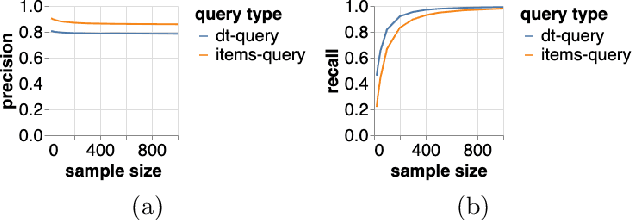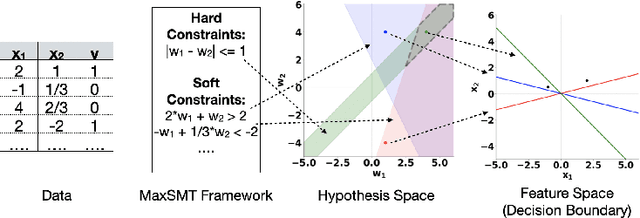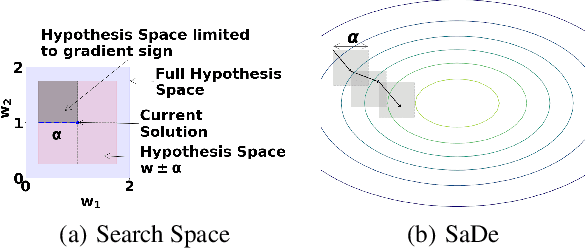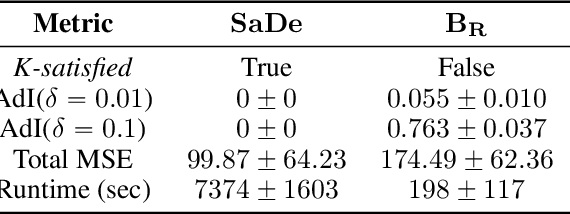Kshitij Goyal
DeepSaDe: Learning Neural Networks that Guarantee Domain Constraint Satisfaction
Mar 02, 2023Abstract:As machine learning models, specifically neural networks, are becoming increasingly popular, there are concerns regarding their trustworthiness, specially in safety-critical applications, e.g. actions of an autonomous vehicle must be safe. There are approaches that can train neural networks where such domain requirements are enforced as constraints, but they either cannot guarantee that the constraint will be satisfied by all possible predictions (even on unseen data) or they are limited in the type of constraints that can be enforced. In this paper, we present an approach to train neural networks which can enforce a wide variety of constraints and guarantee that the constraint is satisfied by all possible predictions. The approach builds on earlier work where learning linear models is formulated as a constraint satisfaction problem (CSP). To make this idea applicable to neural networks, two crucial new elements are added: constraint propagation over the network layers, and weight updates based on a mix of gradient descent and CSP solving. Evaluation on various machine learning tasks demonstrates that our approach is flexible enough to enforce a wide variety of domain constraints and is able to guarantee them in neural networks.
Automatic Generation of Product Concepts from Positive Examples, with an Application to Music Streaming
Oct 08, 2022



Abstract:Internet based businesses and products (e.g. e-commerce, music streaming) are becoming more and more sophisticated every day with a lot of focus on improving customer satisfaction. A core way they achieve this is by providing customers with an easy access to their products by structuring them in catalogues using navigation bars and providing recommendations. We refer to these catalogues as product concepts, e.g. product categories on e-commerce websites, public playlists on music streaming platforms. These product concepts typically contain products that are linked with each other through some common features (e.g. a playlist of songs by the same artist). How they are defined in the backend of the system can be different for different products. In this work, we represent product concepts using database queries and tackle two learning problems. First, given sets of products that all belong to the same unknown product concept, we learn a database query that is a representation of this product concept. Second, we learn product concepts and their corresponding queries when the given sets of products are associated with multiple product concepts. To achieve these goals, we propose two approaches that combine the concepts of PU learning with Decision Trees and Clustering. Our experiments demonstrate, via a simulated setup for a music streaming service, that our approach is effective in solving these problems.
SaDe: Learning Models that Provably Satisfy Domain Constraints
Dec 08, 2021



Abstract:With increasing real world applications of machine learning, models are often required to comply with certain domain based requirements, e.g., safety guarantees in aircraft systems, legal constraints in a loan approval model. A natural way to represent these properties is in the form of constraints. Including such constraints in machine learning is typically done by the means of regularization, which does not guarantee satisfaction of the constraints. In this paper, we present a machine learning approach that can handle a wide variety of constraints, and guarantee that these constraints will be satisfied by the model even on unseen data. We cast machine learning as a maximum satisfiability problem, and solve it using a novel algorithm SaDe which combines constraint satisfaction with gradient descent. We demonstrate on three use cases that this approach learns models that provably satisfy the given constraints.
Feature Interactions in XGBoost
Jul 11, 2020Abstract:In this paper, we investigate how feature interactions can be identified to be used as constraints in the gradient boosting tree models using XGBoost's implementation. Our results show that accurate identification of these constraints can help improve the performance of baseline XGBoost model significantly. Further, the improvement in the model structure can also lead to better interpretability.
 Add to Chrome
Add to Chrome Add to Firefox
Add to Firefox Add to Edge
Add to Edge